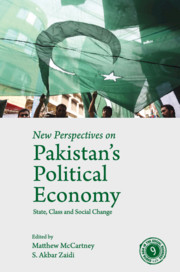Book contents
- Frontmatter
- Contents
- Preface
- Introduction
- 1 In a Desperate State: The Social Sciences and the Overdeveloped State in Pakistan, 1950 to 1983
- 2 The Overdeveloped Alavian Legacy
- 3 Institutions Matter: The State, the Military and Social Class
- 4 Class Is Dead but Faith Never Dies: Women, Islam and Pakistan
- 5 The Amnesia of Genesis
- 6 The Political Economy of Uneven State-Spatiality in Pakistan: The Interplay of Space, Class and Institutions
- 7 An Evolving Class Structure? Pakistan's Ruling Classes and the Implications for Pakistan's Political Economy
- 8 The Segmented ‘Rural Elite’: Agrarian Transformation and Rural Politics in Pakistani Punjab
- 9 Ascending the Power Structure: Bazaar Traders in Urban Punjab
- 10 Democracy and Patronage in Pakistan
- 11 From Overdeveloped State to Praetorian Pakistan: Tracing the Media's Transformations
- About the Contributors
- Index
5 - The Amnesia of Genesis
Published online by Cambridge University Press: 26 April 2019
- Frontmatter
- Contents
- Preface
- Introduction
- 1 In a Desperate State: The Social Sciences and the Overdeveloped State in Pakistan, 1950 to 1983
- 2 The Overdeveloped Alavian Legacy
- 3 Institutions Matter: The State, the Military and Social Class
- 4 Class Is Dead but Faith Never Dies: Women, Islam and Pakistan
- 5 The Amnesia of Genesis
- 6 The Political Economy of Uneven State-Spatiality in Pakistan: The Interplay of Space, Class and Institutions
- 7 An Evolving Class Structure? Pakistan's Ruling Classes and the Implications for Pakistan's Political Economy
- 8 The Segmented ‘Rural Elite’: Agrarian Transformation and Rural Politics in Pakistani Punjab
- 9 Ascending the Power Structure: Bazaar Traders in Urban Punjab
- 10 Democracy and Patronage in Pakistan
- 11 From Overdeveloped State to Praetorian Pakistan: Tracing the Media's Transformations
- About the Contributors
- Index
Summary
This chapter aims to rethink Pakistan's political economy, prompted by S. Akbar Zaidi's critique of Hamza Alavi's influential paradigm. The Alavian model describes the relations between different institutions in Pakistan. These institutions interact with class formations, both ‘indigenous’ and ‘metropolitan’. Zaidi (2014) and Akhtar (2008) amongst others have characterised this model as ‘static’ and ‘dated’. Indeed, much has changed in the intervening forty-five years, both in Pakistan as well as in the study of the processes of political subjection in general. This chapter addresses these changes with particular reference to one of the most significant aspect of the Alavian model – his theory of the state.
MUCH ADO ABOUT NOTHING?
It is conceivable that Hamza Alavi might have glimpsed something right at the moment of its demise. His encounter with this spectre has become the cornerstone of his legacy. Alavi's scholarly corpus is undeniably sophisticated, substantial and significant, and his insights continue to animate important avenues of research on the political process in Pakistan and beyond. However, it is his theorisation of the nature of the postcolonial state that remains his most widely cited insight. Indeed, since its publication, Alavi's outline of this framework in the New Left Review has been cited, according to Google Scholar, more than eleven hundred times by scholars all over the world. This article outlining the idea of the ‘Overdeveloped State’ has been scholars’ primary window into Alavi's work, being cited three times more than anything else he has written.
At the time, Alavi was responding to prevailing debates on the nature of the state internal to a community of scholars who identified themselves as Marxian or Marxist. Much of this debate followed the development of ‘the state’ in the European context from which were derived generally applicable models of the state. Alavi was responding to this geographic bias by considering the manifestation of ‘the state’ in postcolonial societies. His analysis was based on sociological observations made at a specific moment in the social history of Pakistan. This moment was the turbulent 1970s, when the political order was in flux and the eastern half of Pakistan had just managed to liberate itself to form Bangladesh. The debate Alavi was responding to, however, was not centred on Pakistan. His aim, much like his interlocutors at the New Left Review, was to arrive at a ‘generalised’ theory of the state.
- Type
- Chapter
- Information
- New Perspectives on Pakistan's Political EconomyState, Class and Social Change, pp. 110 - 129Publisher: Cambridge University PressPrint publication year: 2019



